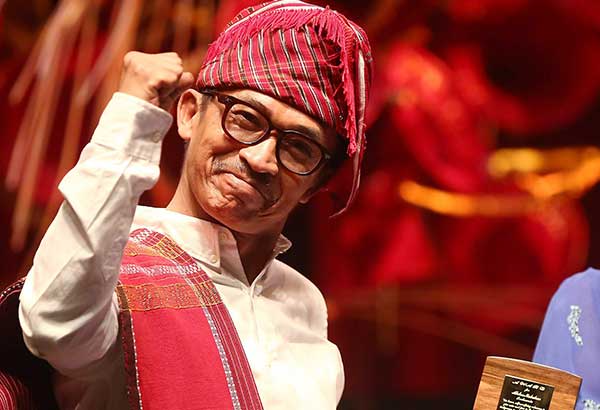Indonesia’s Nababan: Defender of the indigenous

Nababan
2017 Ramon Magsaysay Awards
MANILA, Philippines — In Indonesia, much of the oppression against indigenous people is perpetrated by big corporations due to conflicts over land, said Abdon Nababan, one of six awardees of this year’s Ramon Magsaysay Awards.
Nababan, an indigenous person himself (a Toba Batak from Sumatra), had a rude awakening about the persecution of indigenous people when he worked in an anti-logging campaign and realized that the land taken over by a big industrial estate was actually ancestral land that belonged to his grandparents and other Toba Batak families.
He has since raised this discovery of IP identity and responsibility to involve millions of others.
He became an activist and in 1999 co-organized a congress that launched AMAN (Aliansi Masyarajat Adat Nusantara, or Indigenous Peoples Alliance of the Archipelago), a mass-based organization that today has over 115 local chapters and 21 regional chapters throughout the country’s 34 provinces. Collectively, AMAN represents over 17 million members.
Nababan is recognized for his brave, self-sacrificing advocacy to give voice and face to his country’s indigenous persons’ communities and his principled leadership of the world’s largest indigenous persons rights movement.
When AMAN started, Indonesia’s indigenous peoples – masyarakat adat – were defined by state policy in a way that limited their official recognition to only one million people. AMAN’s major challenge was to represent the actual vast indigenous population totaling 50 million to 70 million, and thus become a real autonomous force. AMAN also needed to build its strength as a movement to effectively influence state policy.
With Nababan at the helm, AMAN became Indonesia’s largest, most influential non-state organization.
It has been quite a ride for the past 24 years as Nababan champions and defends the rights of indigenous peoples.
“Me and my family, we’ve been through a lot. There were even times when I was scared. But, every time, we overcame. And we grew. I became an activist in the late ’80s, opposing the all-too-powerful New Order Regime. In the ’90s I realized that I was also a victim. I am one of millions of indigenous peoples in Indonesia,” Nababan said in his speech during the presentation ceremonies of the Ramon Magsaysay Awards at the Cultural Center of the Philippines last Thursday.
“I fought an industrial company in our ancestral lands. That company, however, was just a front for the real oppressor: authoritarianism and developmentalism. For them, we, the indigenous peoples, were not wanted. We are to be oppressed, to be eradicated, criminalized, impoverished, victimized,” Nababan said.
But despite the struggles and the overwhelming odds, Nababan and his colleagues at AMAN persevered and fought hard to champion the causes of indigenous peoples.
His most important accomplishment was when AMAN won in 2012 a landmark constitutional court ruling which decreed that forests in indigenous peoples’ territories are not “state forests,” thus returning some 57 million hectares of government controlled forest land to indigenous communities.
Nababan also started a massive effort to produce “One Map” of the country’s vast IP territories, after AMAN and supporting NGOs launched the Ancestral Domain Registration Agency in 2010, to create a single data base for verifying land/forest claims on ownership use and tenure in view of incomplete, inaccurate and conflicting government data. By 2016, AMAN had submitted to government “indigenous maps” covering 8.23 million hectares.
But Nababan’s fight continues: the constitutional court ruling and AMAN’s maps still await implementation.
AMAN under Nababan’s leadership improved the welfare of indigenous people and raised awareness that tribes will no longer be placeless and invisible.
Another noteworthy achievement is that AMAN has built up its membership from 200 communities in 1999 to 2,342 communities in 2017, representing a constituency of 17 million individuals. It raised its public visibility and worked collaboratively with government in legal reform, conflict settlement and economic empowerment.
“It’s about self-identification. You have to make people understand. This is about me. This is about my forest, this is about my land, this is about my water.”
What’s noteworthy is that Nababan resolved these matters in peaceful ways.
“When differing opinions or interests manifest into violent conflicts, when the misuse of religion causes more killings, when developing the economy means destroying the environment, standing here before you, I offer the values and spirit of indigenous peoples to tackle present-day problems of our society and the environment – inequality, crimes, climate change – in a way that is not violent, but humane and sustainable,” he told the audience at CCP.
- Latest
- Trending





























